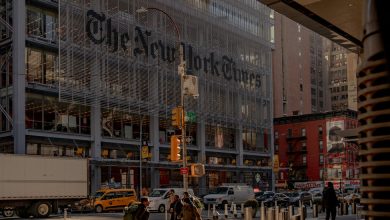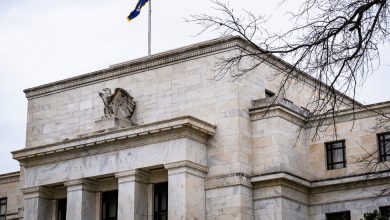Wall Street Poised for Modest Rebound as Economic Pressures Persist

Wall Street appeared headed for a modest upswing when trading starts on Tuesday, a day after a market rout pushed the S&P 500 into a bear market with losses of more than 20 percent from its recent peak.
S&P 500 stock futures rose tentatively on Tuesday even as European markets reversed their own gains and sunk deeper into the red. After an initial steep sell-off, markets in the Asia-Pacific region recovered some their losses.
In another sign that some market jitters had eased, government bond yields — a measure of borrowing costs — pulled back from their highs.
Still, global markets are on shaky ground as multi-decade highs in inflation, supply-chain shortages and geopolitical tensions weigh on the outlook for growth around the world.
In the United States, inflation is accelerating at its fastest pace since 1981, amplifying worries about the direction of the economy as surging prices squeeze household budgets and company profits. As gas, food, rents and other expenses rise sharply, the Federal Reserve, at its meeting this week, is expected to discuss making the biggest interest rate increase since 1994. It will announce its latest policy decision on Wednesday.
It’s a tricky balancing act. If the Fed moves too aggressively to rein in inflation, it could put the brakes on the U.S. economy and cause a recession.
Such concerns triggered a sell-off in markets in the United States on Monday, when the S&P 500, the benchmark stock index, lost 3.9 percent. Since reaching a record high in January, the S&P 500 has fallen 22 percent, marking the seventh bear market in the last 50 years.
The State of the Stock Market
The stock market’s decline this year has been painful. And it remains difficult to predict what is in store for the future.
- Bear Market: Steep downturns of stocks by 20 percent or more are relatively rare, but the length of a bear market can portend damage — for you and the economy.
- Advice for Investors: If you can handle it, investing during a bear market can be an opportunity for people with long horizons.
- Crypto Meltdown: A dire period for cryptocurrencies is illustrating in graphic terms the risks of these experimental investments.
- Looking Back: How nasty could this year’s downturn become? Our columnist turns to history for answers.
“There is not much in today’s calendar that could turn the pronounced bear market,” analysts at Mizuho wrote in a note, but markets could be less volatile as traders prepare their positions for Wednesday’s Fed announcement.
The weakness in stock markets continued in the Asia-Pacific region on Tuesday, although some markets pared their losses by the close. Japan’s Nikkei index was down 1.3 percent at the close while China’s Shanghai Composite Index rebounded late in the day to finish up 1 percent. In Australia, the key stock index tumbled about 3.5 percent, the biggest single-day drop in two years.
Stock indexes across Europe opened higher but then slumped, and were down by about 1 percent by late morning. The Stoxx Europe 600 fell 1.2 percent, after climbing as much as 1 percent, extending its losses into a sixth consecutive day. The index was at its lowest level since March 2021. The FTSE 100 in Britain declined 1 percent and the DAX in Germany fell 0.9 percent.
“Investors are just re-evaluating global risk,” said Bruce Pang, a Hong Kong-based analyst with China Renaissance Securities. “They want to play it safe.”
On Tuesday, government bond yields retreated from their recent highs. The yield on 10-year U.S. Treasury notes fell to 3.30 percent. The day before as stocks plunged, the yield jumped to 3.36 percent, the highest since 2011.
At the same time, cryptocurrencies continued their decline amid a series of market crashes. On Monday, Celsius Network, an experimental cryptocurrency bank, froze withdrawals, panicking depositors. Bitcoin slumped to its lowest since 2020. By early morning in New York, it fallen 7 percent in the past 24 hours, according to CoinMarketCap.
Investors have been trying to make sense of what’s happening in the global economy.
The World Bank issued a grim warning last week, saying recession will be hard for many countries to avoid. On Monday, the credit rating firm Fitch cut its 2022 forecast for global gross domestic product, or G.D.P., to 2.9 percent, from a March estimate of 3.5 percent. These are just the latest in a series of global economic downgrades as Russia’s protracted war in Ukraine strains already stretched global supply chains, disrupts trade and pushes up the prices of oil, wheat, metals and other essential commodities.
As inflation surges, central banks around the world from Australia to Canada have been moving to raise rates. On Thursday, the Bank of England is expected to raise its benchmark rate for a fifth consecutive meeting. Last week, the European Central Bank said it would raise its rates next month for the first time in more than a decade.
On Tuesday, a German measure of investor confidence rose slightly but still remained deep in negative territory as economic growth faces a considerable number of risks.
“Judging by the meltdown in markets this week, however, as investors face up to the risk of shock and awe from the Fed, and a series of rate hikes in the eurozone,” it’s doubtful the rise in investor confidence “will be sustained,” Claus Vistesen, an economist at Pantheon Macroeconomics, wrote in a note.
With the global economic outlook weakening, traders are questioning how far central banks can go in raising rates to impede inflation without worsening the stress on companies and households.
In its forecasts, Fitch cited concerns about “restrictive” monetary policy and inflation, noting that the supply disruptions from the war between Russia and Ukraine are having a “swifter impact on European inflation than expected.”
China is also complicating the picture. As the Chinese government doggedly pursues a zero-Covid strategy, the resulting lockdowns and restrictions have crimped China’s growth and added to the global supply chain woes. Chinese officials are increasingly concerned about the state of the economy, raising doubts that the country will meet its growth targets.
Fitch also slashed growth projections for China because it did not expect the economy to bounce back quickly given the government’s commitment to the zero-Covid policy.





